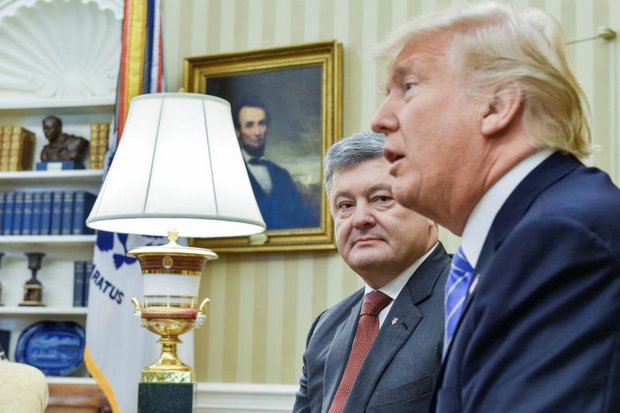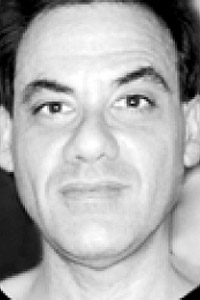
US President Donald Trump just got another chance to fight charges that he's soft on anti-Semitism. Let's hope he took it.
Mr Trump held talks with Ukraine President Petro Poroshenko in Washington on Tuesday. The Ukraine leader emerged from the meeting saying Kiev had "received strong support from the US side" over sovereignty, territorial integrity and the "independence of our state".
For Ukraine, the meeting was a win because Mr Poroshenko got to visit the White House ahead of Russian President Vladimir Putin. For Mr Trump, it seems to have been a missed opportunity to win political capital at home.
Mr Trump should have spoken out against what many see as Ukraine's troubling glorification of Nazi collaborators. Mr Poroshenko presumably focused on Russia's occupation of Crimea and support for separatists in eastern Ukraine's Donbass region. Mr Trump should have broadened the agenda to call out Kiev for its official state policy of honouring controversial figures from World War II.
The latest example: Local authorities in the capital recently voted to rename a major street after a former Nazi collaborator and anti-Semite named Roman Shukhevych. Shukhevych led the Ukrainian Insurgent Army (UPA), an organisation responsible for the mass slaughter of Poles and Jews during the war. Even inside Ukraine the renaming is a disputed move, with hundreds of people taking to the streets last Friday to protest the decision -- only to be attacked by an ultra-nationalist neo-Nazi group called C14.
The renaming plan isn't an isolated event. In 2015, Ukraine passed a law honouring the Organisation of Ukrainian Nationalists and its military wing, the Ukrainian Insurgent Army, (OUN-UPA).
Since then, other streets have been named after the group and its leaders, and the Ukrainian Institute of National Memory (UINM) is drafting a law to posthumously exonerate OUN-UPA members convicted of murdering Polish and Jewish civilians during and after the war.
OUN militias played a major role in pogroms in Western Ukraine that killed tens of thousands of Jews after the Nazi invasion of the Soviet Union. Many OUN members also joined the Ukrainian Auxiliary Police, where they collaborated with the Nazis to kill Jews in western Ukraine in 1941-1942.
After the OUN violently seized control of the UPA in 1943, the UPA also slaughtered between 70,000 and 100,000 Poles in western Ukraine from 1943-1944 and hunted down Jewish survivors of the Holocaust.
US organisations like the United States Holocaust Museum and the Simon Wiesenthal Center have joined Ukrainian Jewish groups in criticising Ukraine's decision to lionise the OUN-UPA. Wiesenthal Center head Efraim Zuroff said that honouring the collaborators "turns Hitler's henchmen into heroes"; Ukraine's chief rabbi called Kiev's decision to name a street after Shukhevych "immoral propaganda".
It's true many Ukrainians see the OUN-UPA primarily through the lens of the group's role in the fight for an independent Ukraine, and, indeed, the UPA fought a valiant guerrilla war against the Soviet Union into the 1950s. But while UINM's leader derides criticism of the OUN-UPA and its leaders as propaganda, historical documentation contradicts this.
The elevation of OUN-UPA has been accompanied by a growing number of anti-Semitic incidents in Ukraine. Numerous Holocaust memorial sites -- including Babi Yar, where over 33,000 Jews were slaughtered by the Nazis -- have been vandalised or desecrated by anti-Semitic graffiti and swastikas.
Ukrainian officials are also guilty of a number of recent anti-Semitic outbursts.
A retired general affiliated with Ukraine's security services called for the destruction of the country's Jews; a member of parliament suggested Ukrainians use the ethnic slur "zhid"; a Ukrainian official called Ukraine's SS Galizien division -- created with the support of Heinrich Himmler -- "heroes"; and the Poroshenko administration awarded Ukraine's Order of Freedom to an author of two books considered blatantly anti-Semitic.
Mr Trump has good reason to speak out against Ukraine's troubling "memory politics". The most important thing is that he could counter perceptions that he's been too tolerant of anti-Semitism.
Although Mr Trump supports the Israeli government and two of his most influential advisers -- daughter Ivanka Trump and son-in-law Jared Kushner -- are Jewish, many Americans believe he failed to disavow the neo-Nazi fringe that supported his presidential campaign.
More troublingly, Mr Trump retweeted comments by apparent white supremacists a number of times during the 2016 election race and even tweeted what many considered to be an anti-Semitic meme about Hillary Clinton.
After his election, Mr Trump was seen as slow to condemn the desecration of Jewish cemeteries and threats against Jewish community centres across the US. Even more worrisome, the White House's official statement on Holocaust Remembrance Day did not mention the Holocaust's 6 million Jewish victims.
Jewish groups are also concerned about reports that the Trump administration will not fill the State Department's office of the US Special Envoy to Monitor and Combat Anti-Semitism. While few suggest that Mr Trump personally holds anti-Semitic views, Mr Trump's condemnation of Kiev's actions could help dispel perceptions that he doesn't pay enough attention to anti-Jewish behaviour.
Beyond Mr Trump's own reasons for speaking out, Ukraine's glorification of OUN-UPA arguably undermines Washington's foreign policy goal of supporting a democratic Ukraine anchored in the West.
Ukraine's veneration of the OUN-UPA also harms America abroad, with Russia's state-owned RT routinely carrying reports claiming that the US backs "fascists" in Ukraine. American policy makers don't need a major Kiev street renamed for a Nazi collaborator.
The historical revisionism could also damage Ukraine's chances of joining NATO and the European Union.
In Poland, where there's strong support for an independent Ukraine, the decision to honour OUP leaders has angered the families of victims of OUP killings, and the country's legislature last year passed a resolution officially terming the UPA's Wolyn massacre of Polish civilians a genocide.
A former Polish deputy foreign minister warned that a Ukraine "under the flag" of the OUP "will never join the European Union". And, as one German commentator points out, honouring Nazi collaborators such as Shukhevych "is out of the question" in modern Germany.
It's possible, of course, that Mr Trump did raise the issue privately with Mr Poroshenko in Tuesday's meeting. But if he did, he needs to make it public. For Ukraine's sake as well as his own.
Josh Cohen is a former USAID project officer involved in managing economic reform projects in the former Soviet Union. The opinions expressed here are his own.
